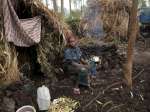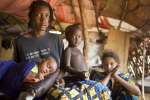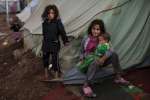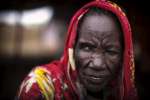- Text size
 |
|  |
|  |
| 
- Français
UNHCR gives refugees in Mozambique the skills to be self-sufficient
News Stories, 2 January 2007

MARATANE REFUGEE CAMP, Mozambique, January 2 (UNHCR) – Leticia Zau picked up the latest eggs laid by hens distributed in Maratane Camp and headed off to join her neighbours at a lecture on how to grow maize. From eggs to maize, from vocational training to granting small business loans, the UN refugee agency is trying to give some 5,000 refugees and asylum seekers in Mozambique the tools to be self-sufficient.
The ambition of the UNHCR self-reliance programme has been made feasible by the government of Mozambique's position that refugees will be able to integrate into the local economy to support themselves – in the camp where most live or elsewhere – until they feel they can return home.
For many of the refugees and asylum seekers living in Mozambique, any date for returning to their homelands is unclear. The largest group, 78 percent of the total, is from the Democratic Republic of the Congo (DRC), mainly the eastern Great Lakes region of the vast country. Most other refugees also fled the Great Lakes area, with 8 percent from Rwanda and 14 percent from Burundi.
Although security has improved in their home countries – DRC just completed a relatively peaceful election – few refugees have sought UNHCR's assistance to repatriate. Since resettlement to a third country can take only a few people per year, most refugees are likely to remain in Mozambique for an indefinite period.
The prospect of prolonged assistance for these refugees – threatening both to make refugees dependent on aid and to drain the limited resources of UNHCR – reinforced the need to make them self-reliant. The success of the chicken project has shown refugees will quickly adopt an idea that will improve their lives.
"The goal is to have them become self-reliant through income generation activities like agriculture and vocational training like welding, carpentry, computers," said Timothee Ntambwe Mawunu, who fled DRC with his family eight months ago and is now coordinator for agriculture and environment projects run by the UNHCR partner, World Relief International.
"These are practical courses so a refugee can take care of himself and his family," said Mawunu, who has already put himself beyond the need for the monthly food rations nearly everyone receives in Maratane. "The whole idea is that a refugee becomes self-sufficient and the activities, like selling eggs or running a business, are self-sustainable."
The chicken programme began only three months ago, providing 100 laying hens to 13 families. Families use some eggs themselves and market 70 a day through World Relief, which sells them in the nearby city of Nampula. The money they receive goes to repay the cost of the chickens and inputs like feed and vaccines. Another four families are fattening chickens that were initially raised by World Relief staff for sale.
The programme's goal is to have families operate independently in six months, assisting with marketing but leaving the purchase of feed to them. The start-up resources – repaid by participants in the programme – can then be used for other families.
"Almost the whole camp wants to participate, but we have registered about 50 for the next stage," said Mawunu. "What we want is a chicken house at every home so they are self-reliant."
The success of the chicken project is the most striking of the self-reliance programmes, but is only one of a range of activities aimed at all the varied backgrounds of refugees. The government has provided 174 square kilometres for the camp, ensuring there is plenty of land for those wishing to engage in agriculture. The instruction in growing maize is designed to diversify the crops.
But refugees can apply for government permission – readily granted – to live and work anywhere in Mozambique except the distant capital, Maputo, 2,300 km away. Courses at the camp from welding to computer skills are designed to ensure refugees find work.
In Nampula, some refugees have set up businesses. It is especially common with Rwandan and Burundian refugees, who often were traders at home. A micro-credit scheme funded by UNHCR has resumed after a troubled start. Tighter controls are reclaiming the earlier bad debts and extending new credit to refugees, many of them women, starting or expanding businesses.
Rose Muhimpundu, who arrived from Burundi with four children after the death of her husband, says she does not want to stay in Mozambique, hoping for eventual resettlement to a third country. But she has taken a loan to expand the stock in her clothing shop.
In a different area of Nampula, Marcel Yussuf Nsabimana, who arrived from Rwanda four years ago with a wife and child, is repaying his second loan and plans to ask for a third to either expand his food shop or set up an additional business. As he explained his plans, he served a steady stream of Mozambican customers.
"We are working on self-sufficiency seriously," said Dr. John Tabayi, head of the UNHCR office in Nampula that oversees the refugee camp. "Eventually everyone will be off food assistance and we will be proud – dependence is not what we want."
By Jack Redden in Maratane Refugee Camp, Mozambique


































































